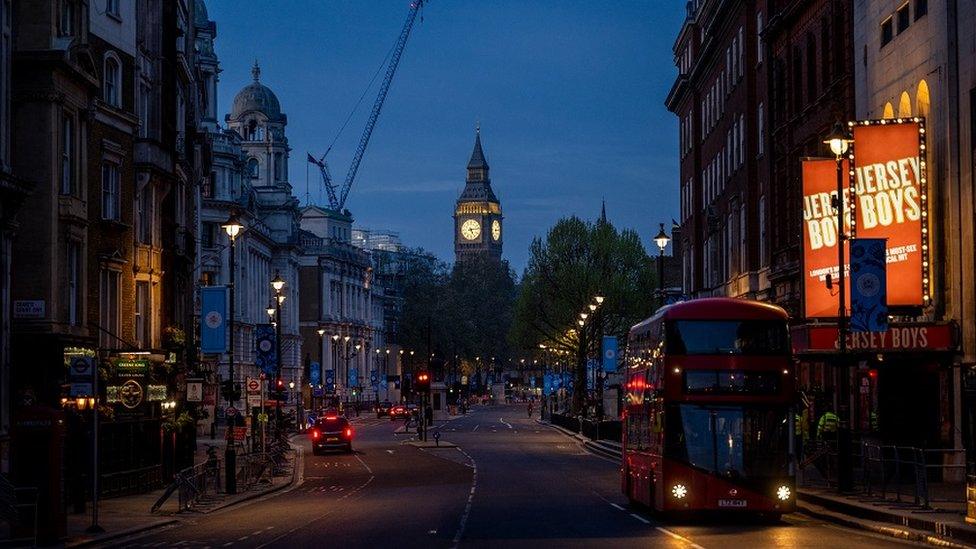What's happening in Parliament this week?
- Published

In the backwash of the Coronation and the local elections, MPs and peers return to action in Westminster, after the extra Coronation bank holiday, with a whole lot of law-making to get on with.
The Commons will zip through yet another bill to deal with the consequences of the suspension of Northern Ireland devolution, and will probably kick back changes to the Energy Bill, which would require a ban on new coal mines.
In the Lords, peers spend much of the week continuing their long march through the detail of the Levelling Up Bill and the Online Safety Bill, teeing up all kinds of amendments for later debate, while preparing for a big set-piece clash on the Retained EU Law (Revocation and Reform) Bill, the following week.
Committee action includes Health taking the pulse of the NHS as the pay dispute drags on, and Justice taking a preliminary look at the new Victims and Prisoners Bill - and watch out for electioneering, perhaps in the form of pointed questions in the Chamber, as rival candidates vie for the chair of the Culture Media and Sport Committee - the election is due on 16 May.
Tuesday 9 May
Commons: Treasury questions, doubtless to be followed by the usual post-break statements from ministers and urgent questions from the opposition (14:30).
Ten minute rule bill: Conservative Tom Hunt wants to bring in a statutory code of practice for post-Grenfell disaster work to deal with dangerous cladding on blocks of flats. He has an example in his constituency where residents have spent almost two years behind a shrink wrap that lets in no natural light or fresh air, with little information about when the work will be completed. He wants a legally binding code of practice to ensure freeholders and building managers can't act with impunity.
Main debate: Second reading of the Energy Bill - this has already been through the Lords, where the government was defeated on five amendments on issues around decarbonising the energy system, including a requirement to bring in regulations banning new coal mines. The government will doubtless deploy its Commons majority to remove most of these - so watch out for signals from minister opening the debate.
Westminster Hall: Lib Dem Richard Foord leads a debate on the merits of a special tribunal to deal with issues arising out of the war in Ukraine (11:30).
Committees: Health (14:30) looks at the impact of strikes on the NHS, with union representatives, the NHS Confederation and NHS Employers.
Education (10:00) quizzes minister Claire Coutinho on support for childcare and the early years.
Justice (14:30) scrutinises the new Victims and Prisoners Bill, with expert witnesses including the chair and chief executive of the Parole Board. The bill is designed to improve victims' experiences of the criminal justice system, and answers long-standing calls to create an independent advocate to support victims of major incidents. It also aims to strengthen the parole system and restrict marriage in prisons for those under whole life orders. It debuts in the Commons on Monday, 15 May.
Lords: (14:30) Peers perform a brief third reading rubber-stamping of the Strikes (Minimum Service Levels) Bill, where the government has been defeated on four detailed amendments, including one to prevent failure to comply with a work notice from being regarded as a breach of contract or constituting lawful grounds for dismissal.
After that, peers resume their trawl through the detail of the Online Safety Bill with day five of a 10-day committee stage.
Wednesday 10 May
Commons: (11:30) Northern Ireland questions, followed, at noon, by Prime Minister's Question Time.
Ten minute rule bill: Labour's Olivia Blake will attempt to introduce the Climate and Ecology Bill, a private members bill already passed by the Lords, which sets targets for the government to cut UK carbon emissions.
Main debate: MPs will debate all stages of the Northern Ireland (Interim Arrangements) Bill, with four hours for second reading and then two hours for detailed amendments, and a perfunctory third reading for dessert.
This is the latest in a series of bills to deal with the suspension of devolved government in Northern Ireland, and allows the Northern Ireland secretary to set a budget for 2023-24 and ensure public services can continue to function in the absence of an NI Executive. The bill is due for debate in the Lords on 18 May.

Peter Frankopan is giving evidence to the Foreign Affairs Committee
Westminster Hall: Independent MP Christina Rees leads a debate on rail infrastructure in Wales (09:30).
Committees: Home Affairs (10:00) continues its human trafficking inquiry with expert evidence including from the Gangmasters and Labour Abuse Authority.
And following the demise of the International Trade Select Committee, Public Administration and Constitutional Affairs (10:00) looks at the scrutiny of international treaties and other international agreements in the 21st century, with a series of legal and constitutional experts.
Foreign Affairs (14:00) hears from rock star don Peter Frankopan, author of The Silk Roads, and other experts, on the UK's engagement in Central Asia.
Lords: (15:00) The highly controversial Illegal Migration Bill has its second reading - watch out for a series of markers going down on attempts to rewrite it at later stages of debate, plus keep an eye on the response from the combative Home Office Minister, Lord Murray of Blidworth.
There's also "ping-pong" over Commons amendments to the Higher Education (Freedom of Speech) Bill. This is the process by which the Lords and Commons resolve differences over the detail of a bill - the two Houses are negotiating over the precise terms of a law allowing people involved in higher education to sue for damages over an infringement of free speech. The Commons has made changes which make it clear that "loss" is not limited to financial loss, and could cover reputational damage or adverse career consequences. There are also changes that allow for a rapid injunction where there has been an alleged breach of the free speech duties.
Thursday 11 May
Commons: (09:30) Cabinet Office questions, starring newly-elevated Deputy Prime Minister Oliver Dowden. That's followed by the weekly update on the forthcoming Commons agenda, from the leader of the House.
Main debate: Two backbench debates - first, Alicia Kearns, the chair of the Foreign Affairs Committee leads a debate on the future of the Overseas Territories, then Sir Stephen Timms, chair of the Work and Pensions Committee, leads a debate on people who have no recourse to public funds, who cannot claim benefits and housing assistance, because of their immigration status.
Westminster Hall: Labour MP John Cruddas leads a debate on Allergy Awareness Week (13:30).
Committees: Public Accounts (09:30) looks at how local councils distributed Covid-19 grants during the pandemic - with a focus on the level of fraud encountered as £22.6bn of public money was paid out to businesses.
Lords: (11:00) Peers continue their detailed scrutiny of the Northern Ireland Troubles (Legacy and Reconciliation) Bill, before moving on to the detail of the Online Safety Bill.
